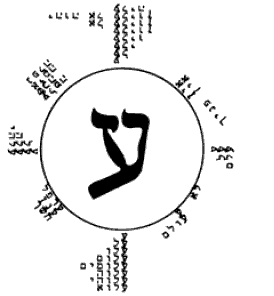DR (continued):
As for the Volk's distinctive destiny, I guess what you're saying is, "we all define 'better place' differently, so what about people who might say the world is a better place with only Jews - or with no Jews?" It's the Hitler argument, really.
I go with Hillel on this one. We evaluate if it's a good thing not through its positive attributes, but by whether it's not something we wouldn't want done to us. Your oversimplification of better place led to Luther's disastrous twisting of the Golden Rule to mean 'you'd want to be killed by a Christian hand if you were a heathen.'
As for art, of course art can make the world a better place. But you must come to understand 'better' from the perspective of someone who cares about the world. As far as I'm concerned, if it makes you smarter, more empathetic, or more attuned to reality, then it will necessarily lead you to be nicer to your fellow humans.
JM:
I mostly agree with you here prescriptively, though I think your
characterization of this ethos as descriptive of some "real" Judaism is a
huge historical inaccuracy. Personally, I have no particular interest in
rooting my social ethics in the "real" practices of someone who lived
hundreds of years ago anyway. I think, though, I just can't handle the
rationalism here. It's nice that God is your conscience, but your
conscience speaks in terms of rational moral norms. I understand the fear
of mysticism expressed in the book, that it leads to the Luther rendition of
"better." But that's not really mysticism. If Luther was uniting with God,
that would mean that God would be here and now for him, in the living face
of the heathen. Instead, he maintains your undefended view of the deus
absconditus, and fills that gap with dogma.
Two hundred years ago, the German Jewish reformers had precisely your program. Religious ritual, they said, was an excrescence on the face of socially progressive Judaism, brought on by the neuroses of diaspora. As you note, it turned into robes and churches and lost its way. But if you look at what's happening to Reform now, the move toward ritual is happening even in places with no robes. It seems like social-justice-Judaism just doesn't satisfy people who are looking for something that a religion does, and that there are a lot of those people. I am all for discarding notions of race and chosenness as a way to prop up the ego. I'd like to efface the ego entirely and become entirely a vessel for the Divine. But I don't believe that when we are suffering great pain or sadness, or when we are at our most profound moments of ecstatic joy, that the articulation of our dreams is really only about "social justice." Do you?
 DR:
DR:
I believe [our concepts of God] must be kept empty so that the sacred can emerge. Just like God's kavod filled the tent of meeting. But, in order to do that, we have to do the first part of nothing sacred, which is hold no truth to be so sacred that it's not up for discussion.
All perspectives matter. Judaism is a process through which many perspectives can exist simultaneously. Do not settle for a belief, when you can have an ongoing experience. The greatest ecstatic experiences will bring you to sense of connection with all living beings. You will care.
Judaism is one system that offers this possibility.

Hypercapitalism as Satanism
March, 2003
May, 2003
The soft borders between Jewish particularism and universalism
February, 2003
It's a lonely world when you're both an anti-globalization leftist and a
Zionist.
May, 2002



Symposium on
Douglas Rushkoff's
Nothing Sacred:
The Sacred and the Profane
A Conversation with Douglas Rushkoff
Reinventing the Wheel: A Review of Nothing Sacred
Michael Shurkin
They Gonna Crucify Me: A 'Lapsed Jew' Responds to Nothing Sacred
Ken Applebaum
Plus these other attractions:
Meditation and Sensuality
Jay Michaelson
Anything You Want to Be
Ben Cohen
Not Mentioned
Hal Sirowitz
Josh Graduates High School
Josh Ring
Zeek in Print
Spring 03 issue available here
Saddies
David Stromberg
about zeek
archive
links
From previous issues:
Eminem & Class Rage
The Art of Enlightenment
The Polity
Dan Friedman
Jay Michaelson
Rachel Dobkin